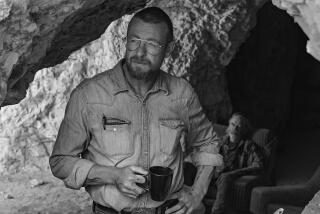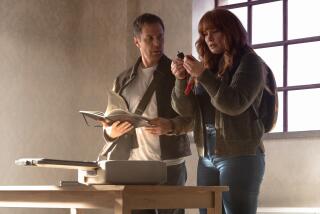Are films like ‘Paranoia’ the start of a post-Snowden movie moment?
“Paranoia” didn’t exactly set the box office afire this weekend. In fact, it nearly sank into the icy depths. The once-promising project -- based on a bestselling Joseph Finder novel, starring an action icon in Harrison Ford and a supposed comer in Liam Hemsworth -- took in a microscopic $3.5 million, landing it in an abysmal 13th place.
Still, the movie -- about a tech whiz who infiltrates a company as a spy, only to be spied on himself -- helps form a new wave of surveillance movies that may have only begun to crest.
Across film and television, it’s been a heady few years for the whole citizens-being-surveilled genre. There’s the corporate-espionage of this summer’s “The East,” the innocents-at-home of the “Paranormal Activity” franchise and the ongoing success of television shows such as “Person of Interest” and “Homeland,” all taking on added urgency in this post-Snowden moment. More awaits with the release this fall of movies with someone-is-watching undertones such as “The Hunger Games: Catching Fire” and “Oldboy.”
PHOTOS: Billion-dollar movie club
The obvious precursor to all this, of course, is the 1970s boom of surveillance-oriented conspiracy films. Back then, movies such as “The Parallax View” and “The Conversation” played on our fears that someone, somewhere, could always see what we’re doing -- while also offering us as an audience the frisson of excitement that comes from watching the spied-upon ourselves.
But as these things tend to do, the revival is coming back in a different way. For one thing, the surveillance shown in those ‘70s films dwelled largely in the world of fantasy -- little real-world technology could do what the movies claimed it could. Now, the surveillance isn’t only possible but also accessible; with a little ingenuity, you could walk into a Radio Shack and pretty much replicate most of what’s on-screen.
Maybe more important, this time around, it’s not the government doing the spying, at least not exclusively. Thanks to the democratization of technology, corporations and lone fliers are able to engage in the kind of surveillance that D.C. once monopolized. In fact, the government even comes off as the good guys sometimes, as they do in the case of “Homeland” CIA-ers Carrie and Saul.
PHOTOS: Celebrities by The Times
“To me, the 1970s movies came about as anti-government reactions to Vietnam and Watergate and the revelations that J. Edgar Hoover had been keeping close tabs on people,” Finder said when I asked him about this issue last week. “That’s no longer what’s going on. Now, it’s that we’re slowly beginning to realize how little privacy we have and how anything can be obtained. It’s technology-oriented, not about what the government has done.”
On the set of “Paranoia” last year, director Robert Luketic had a similar take. “I think we’re all realizing just what’s possible, and that is making for some scary movies and scary lives,” he said.
Disappointing results of his movie aside, there’s reason to think all this will continue. Society may be moving to a place where it’s more common, and thus less shocking, to know we’re being surveilled. But there are few things more cinematic than a man wondering whether someone is watching him, and our collective knowledge that -- increasingly -- it could really be anyone doing that watching. Edward Snowden may have pulled the veil off a lot of our eyes. But there are a lot more startling things left to see.
ALSO:
‘The Butler’ No 1, while ‘Kick-Ass 2’ disappoints
Harrison Ford confronts Chewbacca in ‘Jimmy Kimmel Live’
Follow me on Twitter at ZeitchikLAT
PHOTOS AND MORE
VIDEO: Upcoming summer films
ENVELOPE: The latest awards buzz
PHOTOS: Greatest box office flops
More to Read
Only good movies
Get the Indie Focus newsletter, Mark Olsen's weekly guide to the world of cinema.
You may occasionally receive promotional content from the Los Angeles Times.







